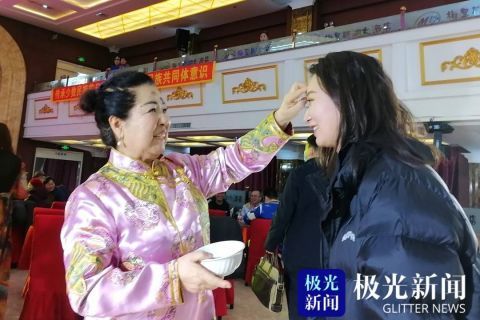Original title: Qiqihar Merisda Compatriots Celebrate the "Smear Festival": The more black they are, the more blessings they have
According to Aurora News, for the Dahuer people living in the Merisda Huer Ethnic District of Qiqihar City, Heilongjiang Province, the fifteenth day of the first month is the end of the year, which is equivalent to Chinese New Year's Eve, and the life of the new year begins on the sixteenth day of the first month, that is, the "Smear Festival". Legend has it that on the day of the "Smear Festival", the god of grain will go down to inspect the world. People smeared each other's faces in order to pray that the god of grain would not spread the smut disease to the human world, so as to bless the harvest and the peace of the people.

From February 16th to 17th, sponsored by the Chinese People's Association and the Heilongjiang Provincial Federation of Literature and Literature, and organized by the Heilongjiang Provincial People's Association, the Qiqihar Municipal Federation of Literature and Literature, Qiqihar University, and the Qiqihar Meris Dahuer Society, the "Our Festival - The Daur Kudege Wudu Day (Smear Festival)" festival and folklore research activity was held in Qiqihar. The reporter followed the research team to experience the joyful atmosphere and festive scene of the Daur ethnic group celebrating the "Smear Festival".
At 16:00 on the afternoon of the 16th, the 38th "Kuodeg Udu Day Festival" opened as scheduled. At the festival site, the people of the Daur ethnic group gathered together, and everyone changed into new and exquisite national costumes to celebrate their traditional festivals through songs and dances, folk performances, "smears" and other activities. The elders of the clan brought out bowls filled with black lacquer pots and ashes, smeared a black dot on the foreheads of the clan and guests, and young men and women also chased each other to plaster each other, and the scene was full of laughter and laughter.
After the smear, a wonderful theatrical performance began. Wonderful programs such as "Happy Festival", "Da ethnic song group", Da ethnic song and dance "Faithful Heart Miss You", "Wu Qin" works "Heroic Journey to the West", "Hanika Catwalk", "Hakumail" song and dance "Farmer Fighting Rabbit", "Happiness" and other wonderful programs express the Daur people's love for a happy life and their vision of a better future.
It is understood that as early as July 2011, the "smear festival" of the Daur people was listed on the provincial intangible cultural heritage protection list, which is a festival of the Daur people during the Spring Festival that symbolizes happiness, auspiciousness, and wishes for a bumper harvest of crops that year. The "Smear Festival" carries a lot of major historical and cultural information and original memories, and plays a non-negligible role in inheriting the history of the Daur people and recording customs and habits, and is a witness to the development process of the history and culture of the Daur people.
During the event, a research group composed of folk culture scholars from three provinces and one district, including Guo Chonglin, vice chairman of the Chinese Nationalities Association and chairman of the Heilongjiang Provincial People's Association, yihe Bai Yila, vice chairman of the Chinese Nationalities Association and chairman of the Inner Mongolia Autonomous Region Nationalities Association, went to the Qiqihar Museum, the Intangible Cultural Heritage Experience Hall of Hala New Village and other places to track and understand the traceability and development of the Dahuo ethnic festival culture, and to investigate the folk traditional culture and historical inheritance of the "smear festival" of the Dahuo ethnic group. On the 17th, an expert seminar with the theme of "Inheriting the Festival Culture of Ethnic Minorities and Building a Solid Sense of Unity of the Chinese Nation" was held to provide suggestions and wisdom for the inheritance and protection of the festival culture of ethnic minorities on the mainland.